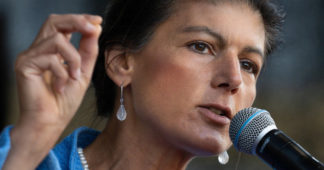By Harri Grünberg
The last party conference of the Left offered a spectacle of mutual encouragement, but no real reflection on the reasons for the defeat. The misery of the Left over the last ten years is not attributed to its own policies, but rather to the evil BSW, which is hastily categorized into the right-wing camp. After all, one must vent their own frustration, and there was plenty of that. Sahra and the BSW were the white elephant in the room.
Many declarations about socialism and class struggle were made—almost everyone invoked class struggle and socialism. Even those who until recently regarded identity politics as the most important issue for a left-wing party cannot conceal that the Left has shifted further right in its stance on peace policy. Until now, the stance of equidistance in the NATO-Russia war applied. Now, the NATO narrative that portrays Russia as the most dangerous form of imperialism is being adopted.
In the issue of Israel’s genocidal war against the Palestinian civilian population, no clear word of empathy for the oppressed Palestinians was heard. On the contrary, the Palestinians are denied the right to resist oppression. The right-wing grouping of the “progressive left” has thus prevailed, even though some of its prominent members are currently leaving the party. The party conference rejected all motions that sought to prevent this shift to the right.
After “Die Linke” failed to clarify its position on NATO and German imperialism, the motion “No to War, Rearmament, and Medium-Range Missiles” was introduced. This motion, put forth by the Federal Working Group for Peace and International Politics among others, called for an immediate halt to all arms deliveries, particularly to Ukraine and Israel. It also stressed the importance of the Left Party actively participating in peace and trade union movements. The peace issue should have been a “top priority” in the Bundestag election campaign alongside social policy. However, the motion ultimately fell short of addressing the need to unify the fight against both war and social injustice in the context of the aggressive war preparations of Western imperialism.
Next, the motion “End the ‘Guns versus Butter’ Policy,” introduced by the Communist Platform along with other working groups, was discussed. In a rush job, the day’s presidium wanted to bury this motion. Although the voting ended before all delegates could participate with open slides, a majority opposed the party executive’s attempt to completely gut the motion. Gutting means that they wanted to strip the motion of its core by means of substitute motions submitted by the party executive. In fact, only the substitute motion submitted by the Party Executive Committee, up to the point of distorting the original motion, was to be dealt with. A majority of delegates rejected this request, dismissed the substitute motion submitted by the Committee, but then also voted against the motion from the Communist Platform. The party conference did not reach a common position on German militarism.
For example, the motion from the Communist Platform stated: “German fascism transformed German militarism into an unimaginably cruel, chauvinistic expression of national hatred and genocide.” In response, the Committee’s counter-motion calls for this sentence and many others to be removed. It also seeks to eliminate any mention of the 27 million Soviet citizens who died. Instead, this paragraph should be replaced with the brief statement: “Two world wars cost millions of lives in the twentieth century.”
The Committee seeks proximity to the NATO stance and thus prefers to remain silent on German militarism and its current war preparations—references to this should disappear from the party conference debate at the request of the Committee. Consequently, large passages critical of NATO and Western armament were also deleted. Instead of positioning itself in opposition to German imperialism, for which the EU is a necessary instrument of power, the party executive wanted the following sentence to be adopted: “The German government must advocate the strategic independence of the EU in order to mediate credibly in international conflicts.”
This illustrates that, despite the performative socialism and anti-capitalism put on for show, the party has shifted further to the right, aligning more closely with NATO at this “New Beginning” party conference, with the backing of the radical faction that identifies as the anti-capitalist left.
Perhaps there is something positive after all: the motion on Unconditional Basic Income (UBI) has been rejected, but in the form of a postponement until after the next Party Congress because that is when the major revision debate on the current Erfurt program, which Oscar Lafontaine and Sahra Wagenknecht played a key role in shaping, is to begin. That’s when affection for NATO will be programmatically solidified.The UBI part of the party program will probably be sold as the culmination of the party’s socialist goal, because UBI means socialism according to the advocates of this idea. But as we know, it is only the distribution within one class to the detriment of the others.
However, it remains to report from the party conference that two new chairpersons were elected.
In summary, the party elected two new chairpersons, Ines Schwerdtner and Jan van Aken, who many delegates felt lacked a strong presence at the conference. There was no fresh input from the Green Youth, and a key motion aimed at accelerating steps toward NATO was presented, while a clear stance against the genocide in Gaza was notably absent. However, the conference did witness a rejection of the Committee’s attempts to downplay German militarism, a firm commitment against the stationing of medium-range missiles in Germany, and the emergence of a few hopeful advocates for peace among the newly elected leadership.
We will take our time to analyze what all this means for the left movement in Germany and for the struggle for peace.
We remind our readers that publication of articles on our site does not mean that we agree with what is written. Our policy is to publish anything which we consider of interest, so as to assist our readers in forming their opinions. Sometimes we even publish articles with which we totally disagree, since we believe it is important for our readers to be informed on as wide a spectrum of views as possible.










